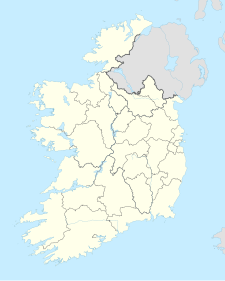St. Ita's Hospital
| St. Ita's Hospital | |
|---|---|
| Health Service Executive | |
 Entrance to St Ita's Hospital | |
| Geography | |
| Location | Portrane, Dublin, Republic of Ireland |
| Coordinates | 53°29′12″N 6°06′47″W / 53.486798°N 6.113066°W |
| Organisation | |
| Care system | HSE |
| Type | Specialist |
| Services | |
| Beds | 200 |
| Speciality | Psychiatric Hospital |
| History | |
| Opened | 1903 |
| Closed | 2014 |
St. Ita's Hospital (Irish: Ospidéal Naomh Ita) is a mental health facility in Portrane in the north of County Dublin in Ireland.
History
[edit]The site selected for the facility, which covered 460 acres (1.9 km2), was the demesne surrounding Portrane House, the former home of the Evans family.[1] The facility was the subject of a design competition which was won by George Ashlin but his proposed price exceeded the budgeted cost and he was asked to reduce the price: the eminent architect, Sir Thomas Drew, objected to Ashlin being selected on this basis.[2] The facility, which was ultimately designed by Ashlin in the Gothic Revival style, opened as the Portrane Asylum in 1903.[1] At a cost of 300,000[3] it was the most expensive building ever commissioned up to that time by the British Government in Ireland.[1]
Irish republican Michael Staines was chairman of the hospital board and on one occasion spent the night there while on the run in 1920.[4]
St. Ita's Hospital Radio commenced broadcasting in December 1983 and was the first radio station in the Republic of Ireland to receive one of the new broadcast licenses after the provisions of the Broadcasting bill were brought into operation in 1988.[5]
After the introduction of deinstitutionalisation in the late 1980s, the hospital went into a period of decline.[6][7] Nearly 500,000 viewers watched an episode of the RTÉ documentary The Asylum which featured St Ita's Hospital in 2005.[8]
In June 2010, the Mental Health Commission instructed the hospital to stop the admission of acute patients on account of the "entirely unacceptable and inhumane conditions" by 28 February 2011.[9] The hospital closed to inpatients in March 2011[10] and to outpatients as well in January 2014.[11]
The Health Service Executive (HSE) announced in February 2012 that the Central Mental Hospital would relocate to the former site of the old St Ita's Hospital.[12] The construction works, which are being undertaken by Rhatigan OHL at a cost of €140 million, are expected to be completed in late 2019.[13]

References
[edit]- ^ a b c "St Ita's Hospital". National Inventory of Architectural Heritage. Retrieved 12 May 2019.
- ^ Irish Builder, 15 April 1895
- ^ "1900 – Lunatic Asylum, Portrane, Co. Dublin". Archiseek. Archived from the original on 19 July 2014. Retrieved 12 May 2019.
- ^ Yeates, Padraig (2012). A City in Turmoil – Dublin 1919–1921 The War of Independence. Gill Books.
- ^ Hospital Radio Archived 2009-02-05 at the Wayback Machine
- ^ "After the Asylum". Irish Times. 13 July 2013. Retrieved 29 May 2019.
- ^ Cotter, Noelle (2009). "Transfer of Care? A Critical Analysis of Post-Release Psychiatric Care for Prisoners in the Cork Region" (PDF). University College Cork. p. 5. Retrieved 29 May 2019.
- ^ "RTE documentary on St Ita's". Irish Times. 19 September 2005. Retrieved 12 May 2019.
- ^ "'Inhumane' conditions in psychiatric hospitals". RTE. 16 June 2010. Retrieved 12 May 2019.
- ^ "St Ita's Hospital is closed to inpatients". Irish Health. 31 March 2011. Retrieved 12 May 2019.
- ^ "Gerry recalls 40 years at St Ita's". The Independent. 28 January 2014. Retrieved 12 May 2019.
- ^ "Central Mental Hospital to be moved to north Dublin". The Journal. 23 February 2012. Retrieved 10 May 2019.
- ^ "New €140m mental health facility 'is in budget and is on time'". The Independent. 16 February 2019. Retrieved 10 May 2019.
External links
[edit]- Hospital buildings completed in 1903
- Hospitals established in 1903
- Hospitals in Fingal
- Psychiatric hospitals in the Republic of Ireland
- Health Service Executive hospitals
- Defunct hospitals in the Republic of Ireland
- 2014 disestablishments in Ireland
- Hospitals disestablished in 2014
- Gothic Revival architecture in Ireland
- Buildings listed on the Fingal Record of Protected Structures

